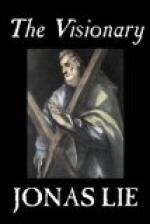lay on the water. He has been used from childhood
to think of the unexpected, the possibility of all
possible things in Nature, as a sword hanging over
every peaceful, quiet hour, and he generally carries
this instinct with him in his intercourse with his
fellow-creatures. While you are talking to him,
he may dive into his mind like the sea-fowl, but you
do not suspect it, and are not therefore disconcerted.
This introspection may occur while he has tears in
his eyes, and in moments when he is most deeply affected—it
is his nature, and he will always retain a dash of
it, even when he has moved, with all his belongings,
from natural into civilised surroundings. He eludes
you, steals, with his imagination and his watchful
suspicion, in, among, and around your thoughts; indeed,
if he is a really talented Nordlander—I
am too dull and disinterested to be able to do it—I
believe that, without your suspecting it, he can go,
with his hands in his pockets, right through your
mind, in at your forehead, and out at the back of
your head. He would be invaluable as a detective
or a diplomatist, if only he had more strength of
character, and succumbed with less childish weakness
to the influence of the moment; but these are unfortunately
his weak points. I am speaking now of the strong
trait in the national character as it shows itself
in the more conspicuous natures, and would not be
misunderstood to mean that men of character are not
to be found in Nordland too—many a time,
perhaps oftener than elsewhere, they are hardened
into something grand.
In a native Nordland family there will generally be
found—such, at least, is my belief—some
drops of Fin blood. It has been remarked elsewhere
that in the Sagas, when the greatest peasant races
in Halgoland were spoken of as descended from half-trolls,
or mountain-ogres, this only meant Finnish descent.
Our royal families were of Finnish extraction, and
Fin was a good-sounding name borne by the greatest
men in the land—for instance, Fin Arnesen.
[One of Olaf the Holy’s most trusted men.] Harald
Haarfager and Erik Blodoexe both married Fin maidens.
The mystic sense-affecting influence which has been
ascribed to them, was only the erotic expression of
the great national connection between the two differently
derived elements; the fair-haired, blue-eyed, larger-minded
and quieter Norwegian, and the dark, brown-eyed Fin,
quick of thought, rich in fancy, filled with the mysticism
of nature, but down-trodden and weak in character.
The Fin, to this very day, goes as it were on snow-shoes
and sings minor strains, while many a Norwegian, in
his pride of race, little suspects that he has any
connection with that despised people.




